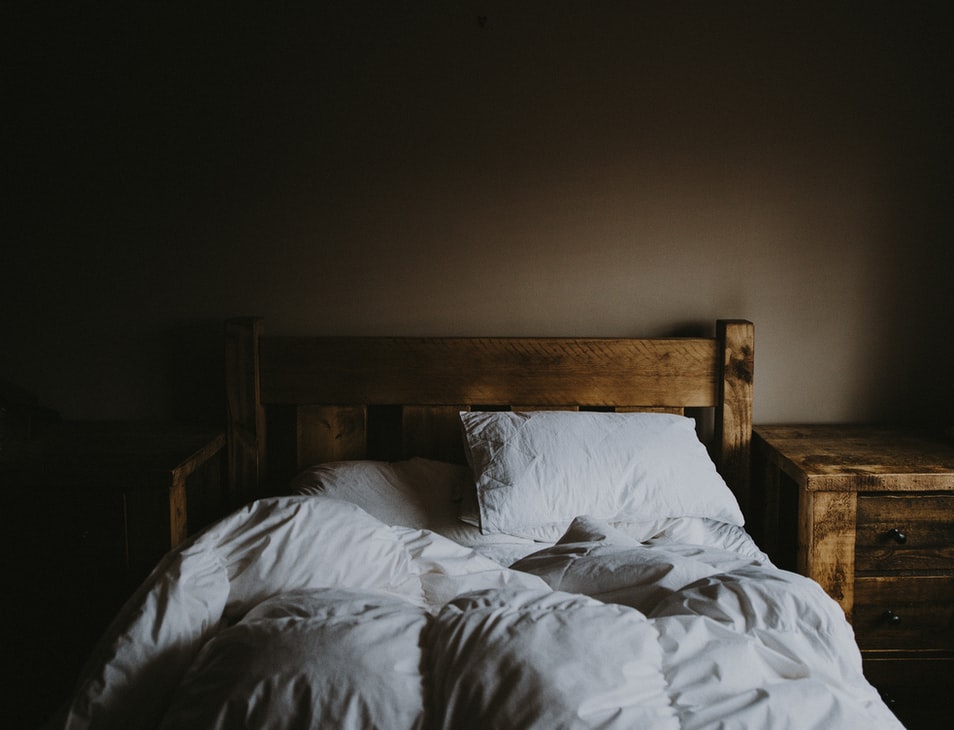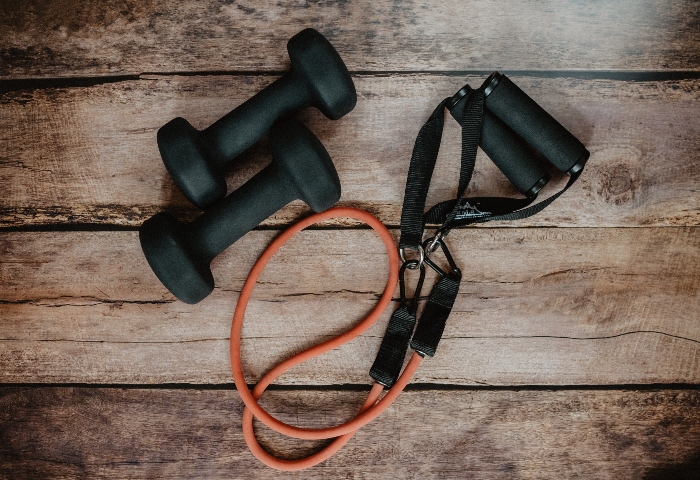Not Enough Time in the Day: Exploring How Busy Schedules Affect Americans’ Sleep

Key Takeaways
- The Time Crunch Dilemma: A significant number of people, particularly those working long hours, reported feeling pressed for time and sacrificing sleep to complete daily tasks. This shortage of time resulted in increased stress and fatigue, leading to negative impacts on work-life balance and overall satisfaction.
- Prioritization and Time Management: Those who effectively managed their time tended to prioritize personal goals and work or career over other areas. Setting a consistent routine, establishing boundaries, and maintaining a clear sense of priority were highlighted as effective strategies for optimizing daily schedules and promoting work-life balance.
- The Sleep Sacrifice: Many individuals who sacrificed sleep to tackle tasks reported experiencing various negative consequences, including compromised bedtime routines, reduced exercise, and a general lack of sleep satisfaction. While there was a common perception that reducing sleep could lead to increased productivity, the findings emphasized the adverse effects of sleep deprivation on overall well-being and performance.
Regardless of what you think you know about time management and productivity, the human brain isn’t capable of processing multiple complex situations at once. At a time when every digital device you own is constantly vying for your attention, and Americans feel so busy at work that they can’t take time off, it’s possible to be overstimulated and stressed.
Like it or not, there are only so many hours in the day, and that means you’re only capable of getting so much done. Still, conflicting priorities and the push to constantly do more could be getting in the way of crucial downtime.
So, how many people are cutting back on sleep to get more done during the day? To find out, we surveyed over 1,000 people about how much time they spend working and sleeping, as well as how they choose to prioritize everything else in between. Here’s what they had to say.
Running Short on Time
It’s incredibly difficult to be productive every hour of every day, and the same goes for working hours. However, around 1 in 5 Americans reported working more than 40 hours every week. Perhaps as a result of spending so much time on the clock, half of those polled felt there wasn’t enough time in the day to get everything done. These people, then, may sacrifice sleep to complete daily tasks. Nearly half of people reporting not enough time also got less than the recommended amount of sleep.
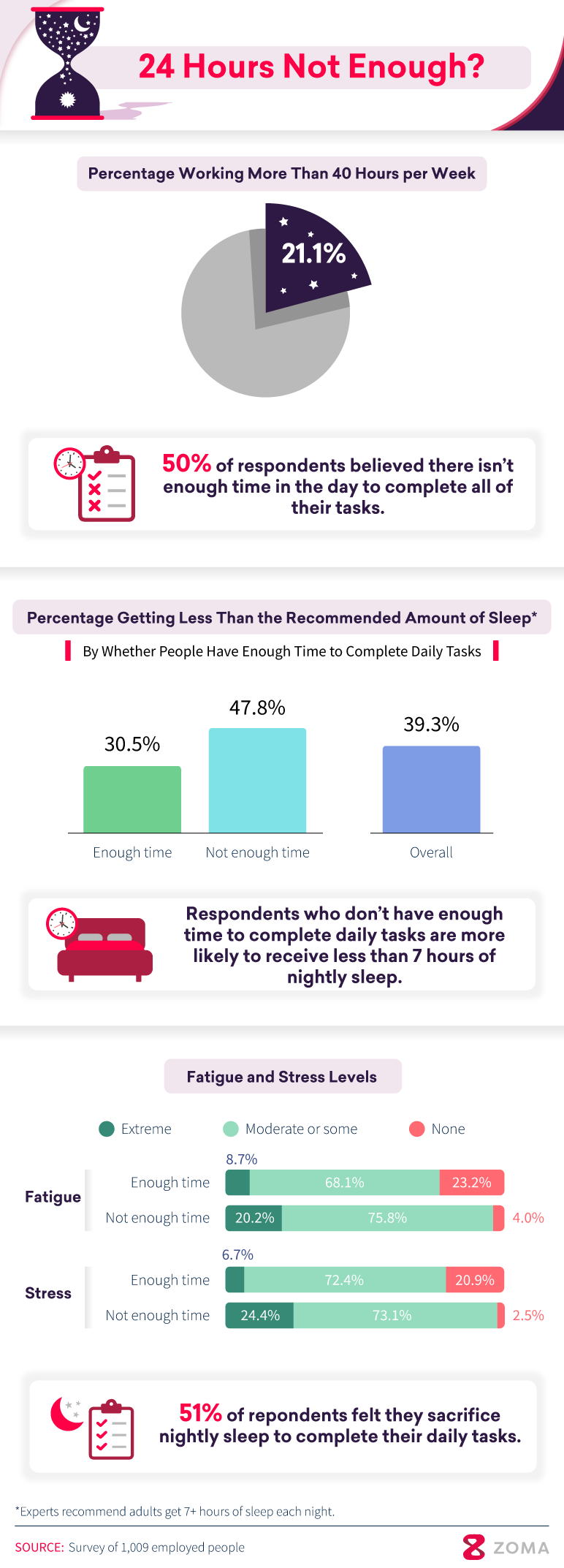
Even more alarming, 1 in 5 people believing there isn’t enough time in the day to get everything done reported being extremely or very tired, and about 1 in 4 were equally stressed. More than half of Americans surveyed felt they sacrifice sleep to complete their daily to-do list.
Time Management on Display
Respondents who didn’t report feeling pressed for time at the end of the day may have had fewer people and tasks competing for their attention.
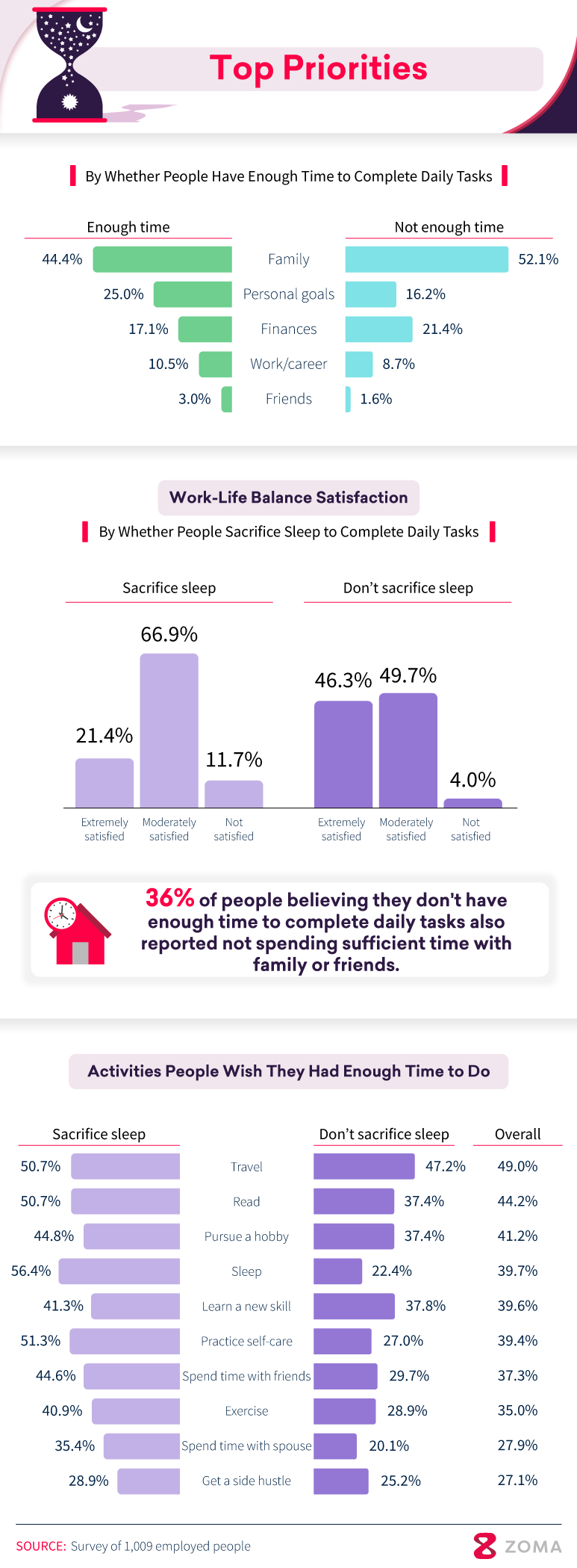
People who said they didn’t have enough time in the day to get things done were more likely to list family and finances as leading priorities. In contrast, people believing they had enough time ranked personal goals and their work or career as higher priorities than those feeling stressed about time.
Nothing you do will give you more time during the day, but you can choose to sacrifice certain priorities for others. Learning time management tips can help you make the most of your day and prioritize what’s important.
If you’re trying to maximize productivity, it might be tempting to cut a few hours of sleep here or there. Compared to nearly half of people who didn’t sacrifice sleep to complete daily tasks and felt extremely or very satisfied with their work-life balance, just 1 in 5 people sacrificing sleep said the same. Instead, more than 1 in 10 people sacrificing sleep to accomplish daily tasks reported being not at all satisfied with their work-life balance.
Additionally, more than 1 in 3 people lacking time reported not being able to spend as much time with their friends or family as they wanted. More than half giving up sleep also wished they had more time to sleep, practice self-care, travel, and read.
Ripple Effect
Even if you aren’t constantly pressed for time, you might still occasionally wish you had more of it. Around 4 in 5 respondents believed they’d never get to check off all the items on their to-do list. For the most part, people feeling browbeaten by a lack of time acknowledged the negative impact on their life satisfaction (76 percent), health (69 percent), and productivity (64 percent).
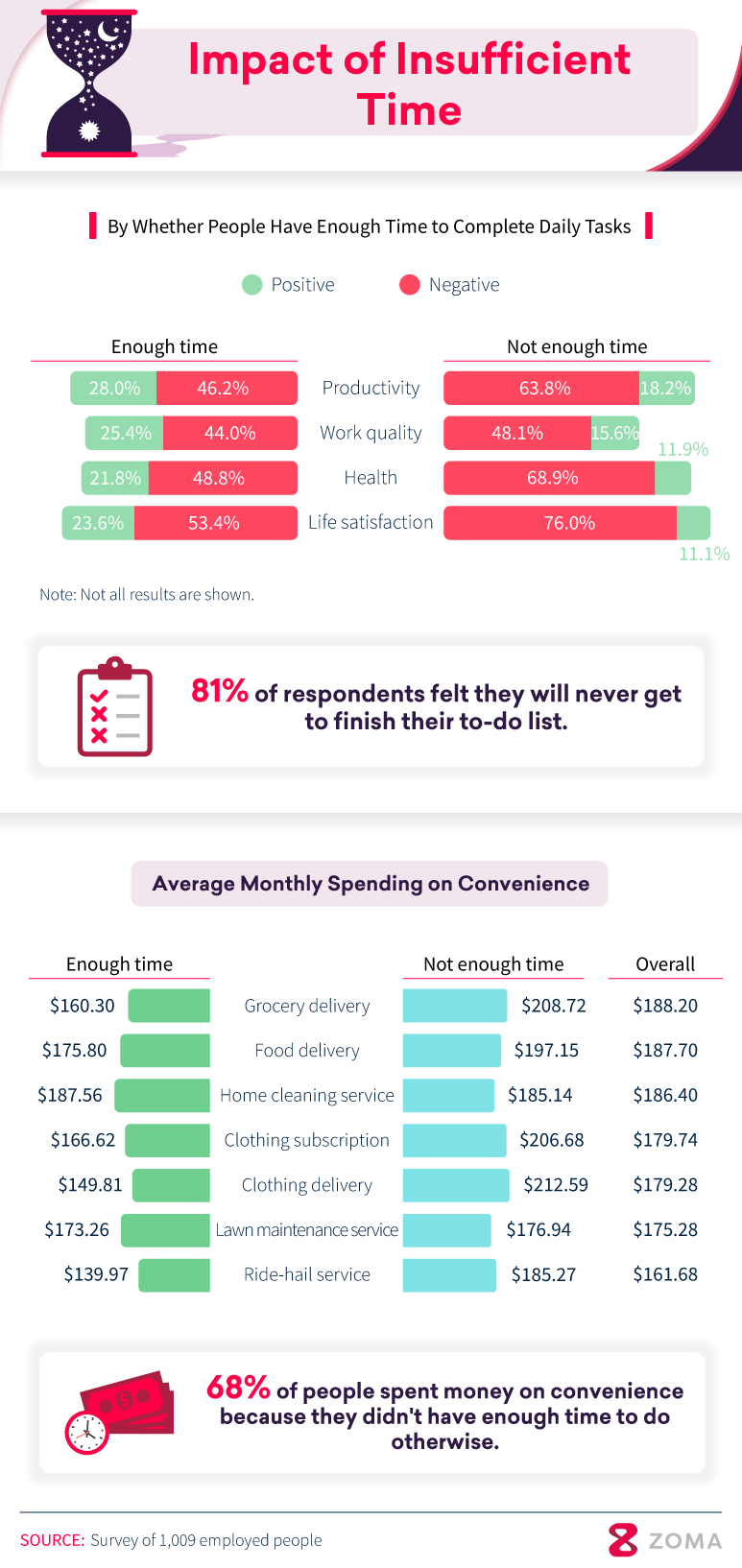
Having too much on your plate might not just cost you sleep or self-care; it could cost you money. Sixty-eight percent of people said they spent money to try and save time. People who identified as not having enough time spent nearly $50 more every month on grocery delivery, $40 more on clothing subscriptions, and over $60 more on clothing delivery. To make some tasks more convenient, people trying to get too much done spent more on delivery and service categories, with the exception of home cleaning.
Counting Sheep
When you’re willing to deprioritize sleep to get more things done, you sacrifice more than just rest.
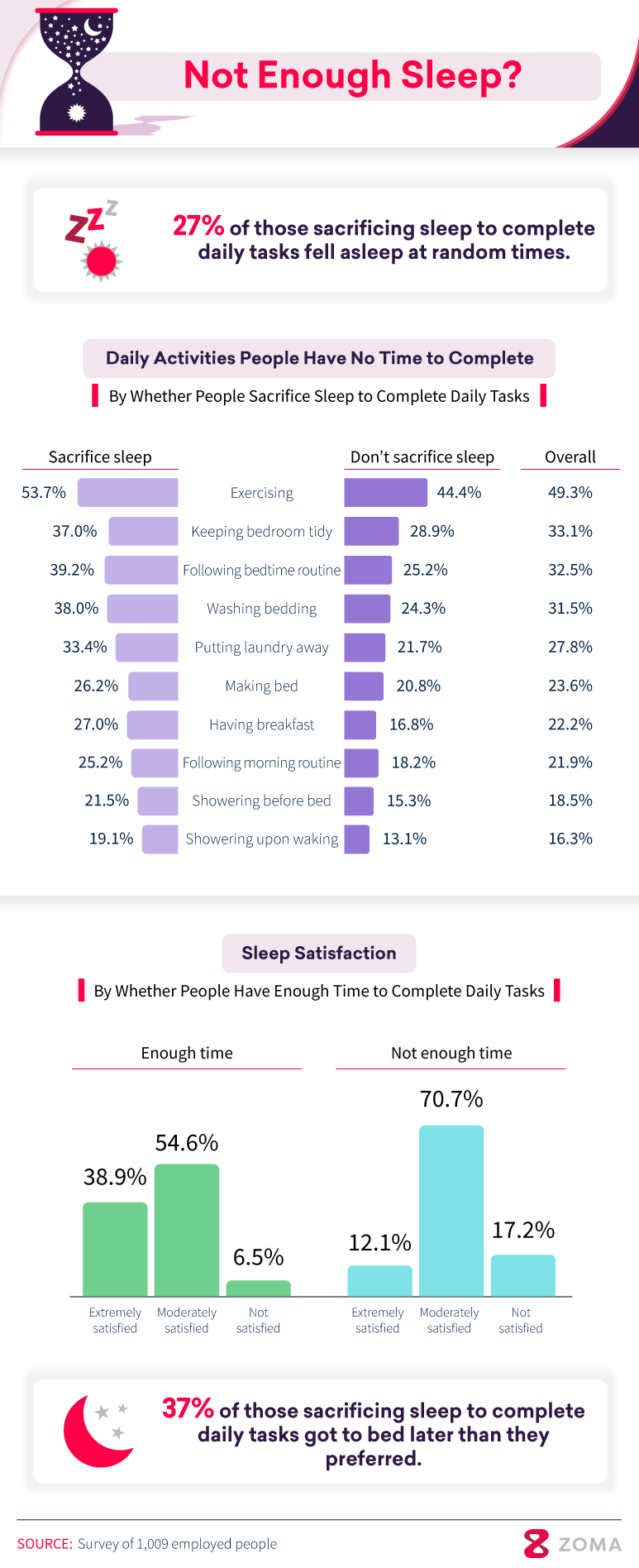
While 27 percent of those sacrificing sleep reported falling asleep at random times, more than half sacrificed exercise, followed by a bedtime routine (39 percent), clean bedding (38 percent), and a tidy bedroom (37 percent). Establishing a morning routine might sound like the kind of thing that requires waking up earlier or having more energy, but setting a standard for the first few hours can help boost your productivity throughout the day.
Compared to nearly 7 percent of people with enough time, around 17 percent struggling to get things done said they experienced no sleep satisfaction. More than 1 in 3 people sacrificing sleep also got to bed later than they preferred.
Committing to Sleep
If you’re trying to pack too many things into your day or you can’t decide which tasks to prioritize, you might end up cutting back on sleep instead. However, lack of sleep can affect the rest of your day, ultimately leaving you less productive than people getting more rest nightly.
After seeing the results of this survey, Zoma’s sleep expert James Nguyen said, “Everyone is always trying to get more done, but there are only so many hours in the day. Getting less sleep isn’t a secret weapon to getting more done.It will just leave you feeling tired and unproductive.”
At Zoma, nothing matters more to us than making sure you get the sleep you need when you need it. At the core of our mission are mattresses designed to give you a deeper, more comfortable slumber, so you can wake up energized and ready to take on the day. Mattresses aren’t a one-size-fits-all purchase, which is why we work to match you with your perfect fit.To learn more about the technology behind our mattresses, visit us at ZomaSleep.com today.
Methodology
For this project, we surveyed 1,009 employed people. Unemployed or retired respondents were omitted. Respondents had to answer questions about their daily tasks, how they managed time to try to finish their to-do list, and the effect this had on their sleep and well-being.
Respondents ranged in age from 23 to 60 with an average age of 37 and a standard deviation of 9. Forty-nine percent of respondents identified as men, and 50 percent identified as women.
For short, open-ended questions, outliers were removed. To ensure that all respondents took our survey seriously, they were required to identify and correctly answer an attention-check question.
Limitations
These data rely on self-reporting by the respondents and are only exploratory. Issues with self-reported responses include, but aren’t limited to, exaggeration, selective memory, telescoping, attribution, and bias. All values are based on estimation.
Fair Use Statement
Help make sure your readers aren’t biting off more than they can chew. Share the results of our productivity findings for any noncommercial use by adding a link back to this page and crediting Zoma’s sleep expert James Nguyen.
This article is for informational purposes and should not replace advice from your doctor or other medical professional.
Michelle Zhang, Wellness Writer 
Michelle Zhang is a regular contributor to our Zoma blog and is our go-to sleep researcher. In her time with Zoma, Michelle has researched and published many articles on widespread sleeping habits and troubles. In her time outside of Zoma, Michelle is an occupational therapist and long-distance runner. She believes leading a healthy lifestyle is the key to getting better sleep at night. Michelle's work has been featured on Men's Journal, The Frisky, and The Mighty.
View all posts

